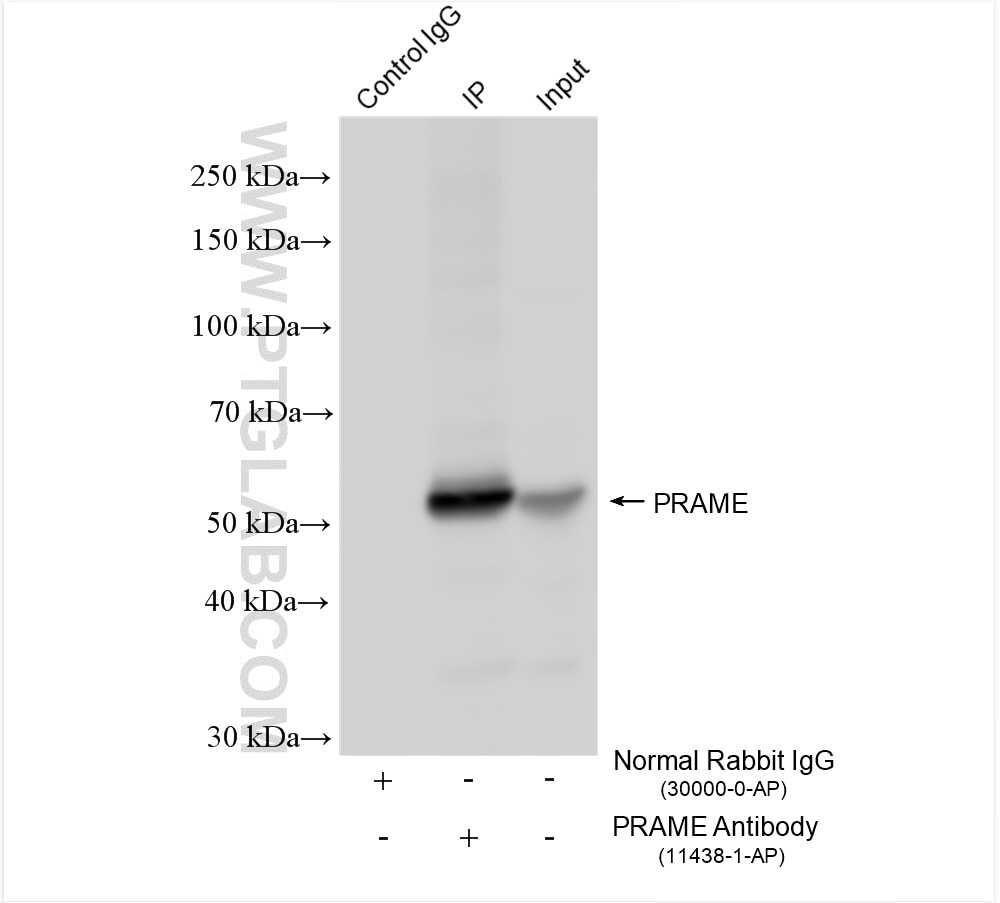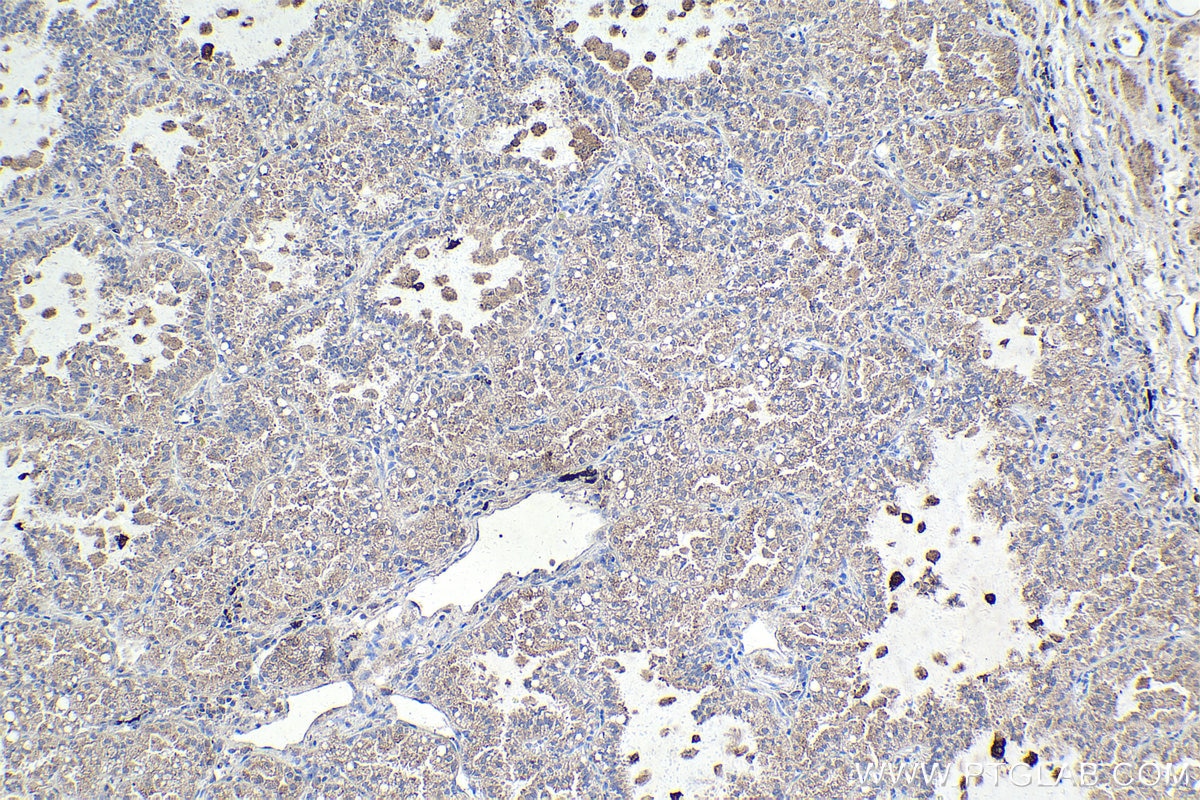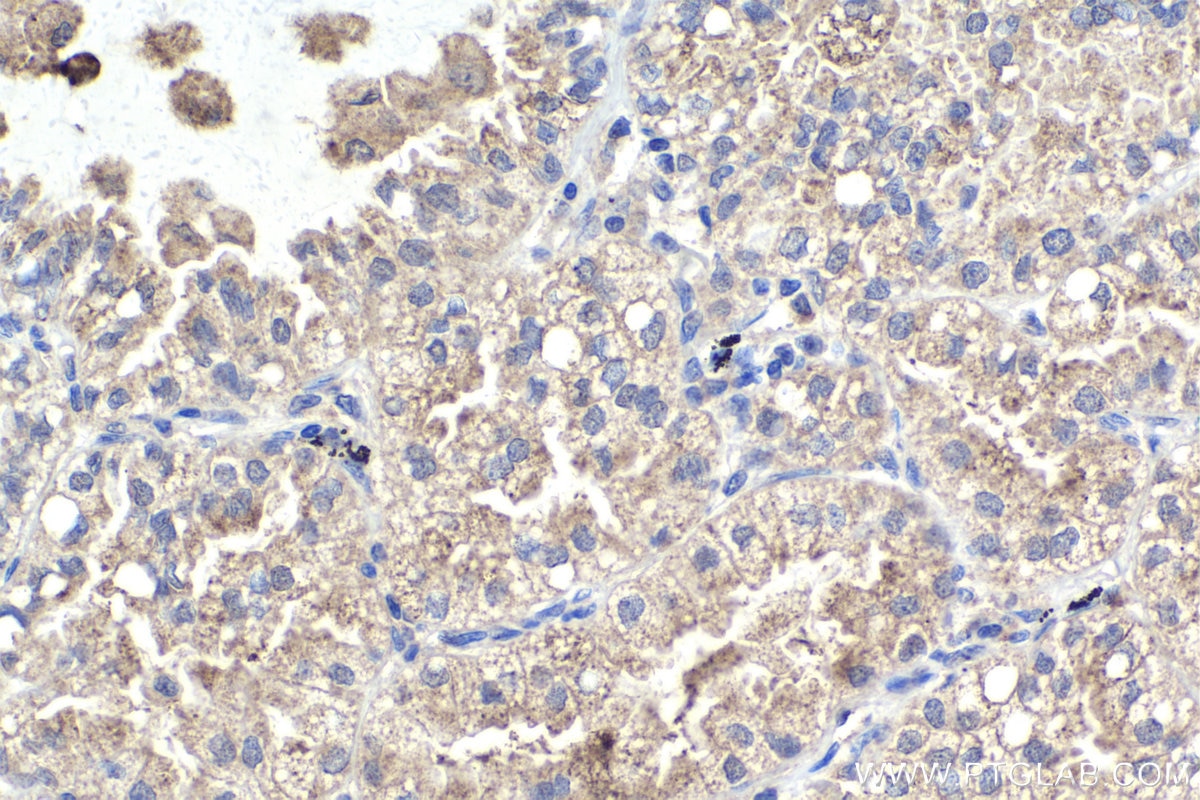PRAME Polyklonaler Antikörper
PRAME Polyklonal Antikörper für WB, IP, IHC, ELISA
Wirt / Isotyp
Kaninchen / IgG
Getestete Reaktivität
human
Anwendung
WB, IP, IHC, ELISA
Konjugation
Unkonjugiert
Kat-Nr. : 11438-1-AP
Synonyme
Geprüfte Anwendungen
| Erfolgreiche Detektion in WB | K-562-Zellen |
| Erfolgreiche IP | K-562-Zellen |
| Erfolgreiche Detektion in IHC | humanes Lungenkarzinomgewebe Hinweis: Antigendemaskierung mit TE-Puffer pH 9,0 empfohlen. (*) Wahlweise kann die Antigendemaskierung auch mit Citratpuffer pH 6,0 erfolgen. |
Empfohlene Verdünnung
| Anwendung | Verdünnung |
|---|---|
| Western Blot (WB) | WB : 1:500-1:1000 |
| Immunpräzipitation (IP) | IP : 0.5-4.0 ug for 1.0-3.0 mg of total protein lysate |
| Immunhistochemie (IHC) | IHC : 1:50-1:500 |
| It is recommended that this reagent should be titrated in each testing system to obtain optimal results. | |
| Sample-dependent, check data in validation data gallery | |
Produktinformation
11438-1-AP bindet in WB, IP, IHC, ELISA PRAME und zeigt Reaktivität mit human
| Getestete Reaktivität | human |
| Wirt / Isotyp | Kaninchen / IgG |
| Klonalität | Polyklonal |
| Typ | Antikörper |
| Immunogen | PRAME fusion protein Ag1906 |
| Vollständiger Name | preferentially expressed antigen in melanoma |
| Berechnetes Molekulargewicht | 509 aa, 58 kDa |
| Beobachtetes Molekulargewicht | 50-58 kDa |
| GenBank-Zugangsnummer | BC014074 |
| Gene symbol | PRAME |
| Gene ID (NCBI) | 23532 |
| Konjugation | Unkonjugiert |
| Form | Liquid |
| Reinigungsmethode | Antigen-Affinitätsreinigung |
| Lagerungspuffer | PBS with 0.02% sodium azide and 50% glycerol |
| Lagerungsbedingungen | Bei -20°C lagern. Nach dem Versand ein Jahr lang stabil Aliquotieren ist bei -20oC Lagerung nicht notwendig. 20ul Größen enthalten 0,1% BSA. |
Hintergrundinformationen
The PRAME (preferentially expressed antigen of melanoma) gene was previously shown to be overexpressed in ovarian/primary peritoneal serous carcinoma compared with malignant mesothelioma using gene expression arrays. It is considered a melanocyte differentiation antigen which is overexpressed in both solid and hematologic tumors. In normal tissue, a very low level of PRAME expression is found in normal testis, adrenals, ovary and endometrium. A high level of PRAME expression has been reported for several solid tumors, including ovarian cancer, breast cancer, lung cancer and melanomas, medulloblastoma, sarcomas, head and neck cancers, neuroblastoma, renal cancer, and Wilms'tumor. As a nuclear transcriptional repressor protein, PRAME binds to retinoic acid receptor a, thereby inhibiting retinoic acid induced differentiation, growth arrest, and apoptosis.
Protokolle
| PRODUKTSPEZIFISCHE PROTOKOLLE | |
|---|---|
| WB protocol for PRAME antibody 11438-1-AP | Protokoll herunterladen |
| IHC protocol for PRAME antibody 11438-1-AP | Protokoll herunterladenl |
| IP protocol for PRAME antibody 11438-1-AP | Protokoll herunterladen |
| STANDARD-PROTOKOLLE | |
|---|---|
| Klicken Sie hier, um unsere Standardprotokolle anzuzeigen |





